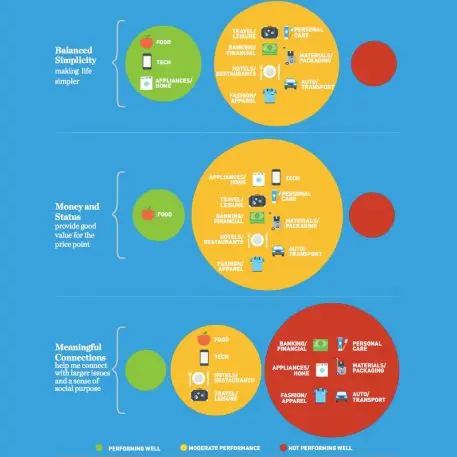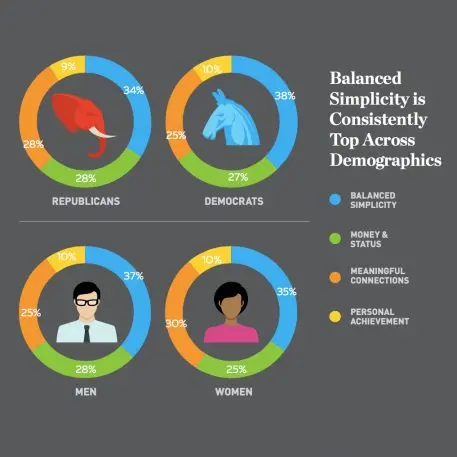What does the phrase “the good life” mean to you? Having enough money to do what you want? Achieving milestones in your career? Seeing family and friends regularly? Living more simply and healthily?
A new survey finds that many of us pine for simplicity and health. We want more balance between work and home life. We don’t think money buys happiness. We’re prepared to give up money and luxury goods if it means fulfillment in our jobs. Moreover, despite America’s political differences, and its reputation for privileging status and money above all else, a lot of us feel the same way. There’s a surprising consensus on good life questions.
The research, from conscious capitalism booster Sustainable Brands and conducted by Harris Poll, ran in two parts. First more than 2,000 Americans were asked, in an open-ended way, what the good life means to them. Then, a second poll asked, quantitatively, what’s most important. More than one third of respondents (36%) prioritized “balanced simplicity;” 28% said “meaningful connection” with community is most important; 26% said “money and status.” And only 10% said “personal achievement” in career or educational standing.

To KoAnn Vikoren Skrzyniarz, CEO and founder of Sustainable Brands, the results indicate an opportunity for companies. Brands that can connect with consumers on their deeper desires–as opposed to their material wants–are likely to prosper in the future, she argues.
“Consumers have not quite gotten hold of what’s bugging them about the current relationship they have with brands. But they yearn for a more balanced, connected, and meaningful life, and that’s an opportunity to drive more sales and loyalty,” she says. “People are conscious that Madison Avenue’s push for us to buy more and more things is not creating happiness. But they don’t know how to change their life, and they don’t see brands helping them come to terms with this yet.”
Strikingly, the interest in balanced simplicity holds firm across demographics. From Republicans to Democrats, millennials to boomers, women to men, from 30% to 40% of respondents put balanced simplicity uppermost. “The media is portraying us as more separate than we are,” Skrzyniarz says. “It’s not picking up on the connection shared between generations, geographical regions, political affiliations, and socioeconomic breakdowns.”

The research looked at how consumers view different industries and their responsiveness to our desires for a good life. Food companies resoundingly come out best. Food brands are seen as helping us live more simply and healthily, providing value for money, and meaningful connections” By contrast, financial services and automative companies are seen as comparatively less responsive in helping connect us with a “larger life purpose.”
Skrzyniarz says brands like Panera Bread, Clif Bar, Patagonia, and REI exemplify balanced simplicity, standing out for “quality over quantity” and “usefulness over triviality.” Unprompted, respondents in the survey regularly named Apple, Amazon, Google, Procter & Gamble, Trader Joe’s, and Panera as fulfilling ideals of the good life. Consumers increasingly want products and services that are simpler and contribute to health and well-being, the report says.
Skrzyniarz also notes that the potential universe for good life brands is larger than commonly thought. In the survey, 28% of respondents said they had purchased a product because it accorded with their idea of the good life. But double that percentage may be persuadable. In the survey, 65% said they can influence a company to offer healthier, simpler, more environmental products. Other surveys have shown something similar. Roughly a third of U.S. consumers are switched on to responsibility and sustainability issues. Another third doesn’t care. And another third is movable. It is just waiting for the right products at the right prices.
“There is a lack of consistency of commitment, communication, and education from brands. They are being somewhat haphazard in changing their value proposition between products, and they’re not communicating [their values] in a way that generates confidence,” Skrzyniarz says.
Recognize your brand’s excellence by applying to this year’s Brands That Matter Awards before the early-rate deadline, May 3.
